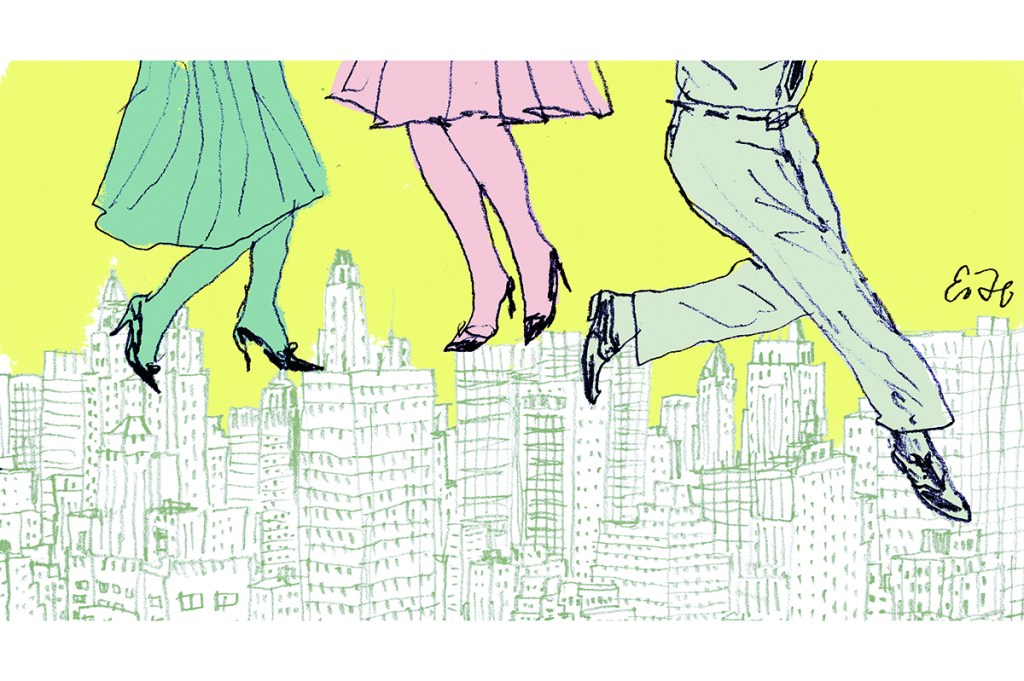Coco Mellors’s lively, involving debut novel begins on New Year’s Eve in New York, with Cleo and Frank meeting in a descending elevator. It’s a sure sign that their future relationship will not end well. Cleo is British, young, golden and an artist; Frank is American and old (well, he’s in his late thirties), and he has taken the devil’s dollar by working in advertising. Cleopatra and Frankenstein deals primarily with the indistinct boundaries between commerce and art, set against a backdrop of neurotic New Yorkers, glitter, drugs and booze.
As Frank walks Cleo home through streets full of hedonists, swapping one liners and teasing each other, they fall in love (or at least, into a clinch on the stairs of her dingy apartment). Mellors has a well-tuned ear for dialogue, and she captures their clowning beautifully, as when Frank buys Cleo a slice of pizza:
“Here,” he said.
“To make up for the years of systemic sexism.”
“Wanker,” said Cleo and took a bite.
“You’re in America now,” Frank said. “Here, I’m just an asshole.”
It’s laced with poignancy, since Frank is telling the truth about himself: he is kind of an asshole. Many of the lines sound like they’ve been picked up from parties around town, and all contribute to a sense of a city both beloved and ridiculous.
Soon, the pair are married (“don’t do it, Cleo!” the reader shouts), partly, their friends believe, because Cleo needs a green card; but they do seem to be in love. Frank wears a white top hat to his wedding (he’s kooky like that), and Cleo a nightgown she bought unwittingly, believing it to be a dress. Their party is pure New York fantasy, complete with a gay best friend whose wedding gift is a Fabergé egg with cocaine hidden inside it, and a chef buddy who does all the catering.
If it feels too idyllic, it’s because both Cleo and Frank are too self-aware, aiming towards impossible versions of themselves. As the months progress, not much they do goes right. As a gesture of reconcilement, Frank buys Cleo a sugar glider; and yes, the tiny marsupial ends up functioning as a symbol of their dying relationship, poor thing.
The hapless couple must come to terms with the realities of the world around them, as well as with their attempts to dispel the hereditary demons that haunt them. Cleo struggles with the death of her mother, while Frank’s mother was an alcoholic. The novel asks whether they will ever be able to break free from those influences.
Mellors dips into and out of their perspectives, as well as those of others in their circle, each character dancing around, trying to find meaningful relationships. Quentin is the queeny best friend, with a Polish heiress for a grandmother, who can’t tell his family he’s gay. There is a decidedly meaty description of a gay orgy, which Quentin flees only to find himself in the arms of a meth addict. You win some, you lose some.
Zoe is Frank’s mixed race little half-sister; despite possessing almost supernatural beauty, she still seems to be following in both Cleo and Frank’s doomed footsteps. Like Cleo, she wants to be an artist (in her case, an actor); also like Cleo, she can’t face up to commercial necessity. And like Frank, she turns to drink, and eventually to dodgier ways of earning a living. This feels as if it needed more thought: she gets work as an escort and instantly meets a kindly Japanese hedge funder whose only wish is to please her. It reads oddly, as Mellors does seem to be interested in morality, since Quentin is punished for his sins, vanishing into a frightening world of meth addicts.
The most involving of the secondary characters is Eleanor, a Jewish woman in her late thirties, who starts work at Frank’s firm. Hers are the only sections in the first person, and they are gloriously, mordantly witty. She is writing a children’s animation set on a garbage heap about two parasites called Scrip and Scrap. If Mellors intends us to read them as versions of Cleopatra and Frankenstein, she’s keeping her cards pretty close to her chest. I wanted more of Eleanor. A sequel, please?
Mellors offers some gently satirical takes on cosmopolitan excess: the excruciating sex workshops, the hypocrisy, the general sense of hustle. The novel’s climax comes at an art show given by one of Cleo’s most successful contemporaries. It’s all, she realizes, about branding: art and money make comfortable bedfellows. Frank may have “sold out,” but he still supports both Cleo and Zoe.
The novel turns on a self-destructive action by Cleo that doesn’t quite convince in terms of her character, but it does propel the narrative into a more reflective final third, which deals with loss and love in a mature, finely balanced and often very moving manner. These New Yorkers are displayed in all their humanity, and spending time among their brightness, laughter and tears is delightful. Mellors is a sparkling, intelligent talent, and I look forward eagerly to what she does next.
This article was originally published in The Spectator’s February 2022 World edition.

























